This week, we're in Bologna at Il Cinema Ritrovato. Our favourite venue is the giant screen in Piazza Maggiore where we will experience tonight "the extravagant cinematic inventions of The Third Man" - according to the Festival website. Just like her co-stars Joseph Cotten, Orson Welles and Trevor Howard, the female Italian star of this British classic is unforgettable... Strikingly beautiful Alida Valli (1921-2006) started as Italy’s sweetheart of the early 1940s. She fascinated audiences with her flawless porcelain face, her dark, voluptuous hair and her green, expressive eyes, but also with her ability to simultaneously hide and reveal a character's thoughts and emotions. In a career that spanned seven decades, she appeared in more than 110 films including such classics as Luchino Visconti's Senso (1954), Michelangelo Antonioni's Il Grido (1957) and Bernardo Bertolucci's Strategia del ragno (1970). And The Third Man (Carol Reed, 1949).
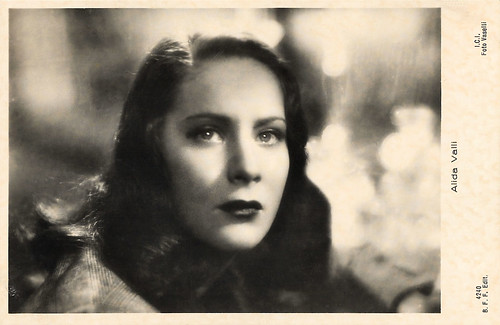
Italian postcard by Ballerini & Fratini, Firenze (B.F.F. Edit.), no. 4240. Photo: I.C.I. / Vaselli.
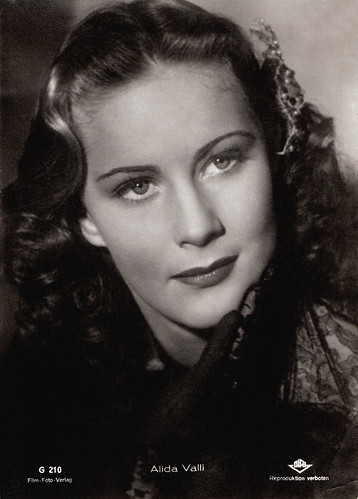
German postcard by Film-Foto-Verlag, no. G 210, 1941-1944. Photo: Difu.
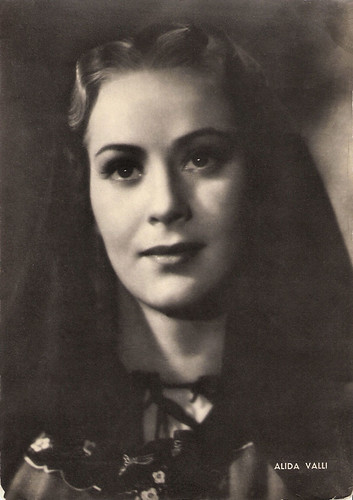
Italian postcard by Aser, Roma, no. 250. Photo: Pesce.
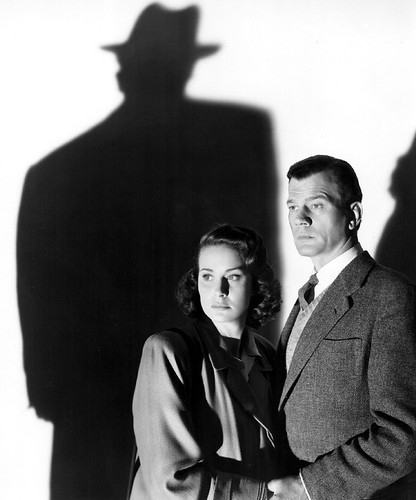
Still from The Third Man (1949) with Alida Valli and Joseph Cotten. Source: Dr. Macro's.
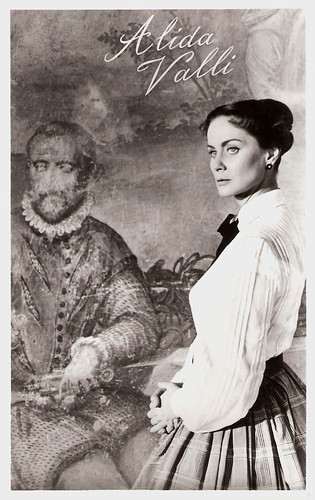
Dutch postcard by Takken, Utrecht, no. 1683. Photo: publicity still for Senso (Luchino Visconti, 1954).
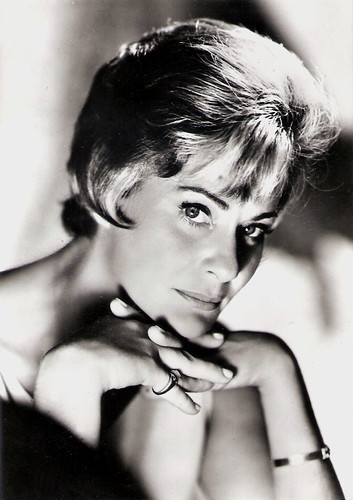
Italian postcard by Alterocca, Terni, no. 49474.
Alida Valli was born as Alida Maria Laura von Altenburger in Pola, a town located in Italy’s Istria region (now Pula, the town currently is part of Croatia) in 1921. Her father, Baron Gino Altenburger, was a philosophy professor and part-time music critic of aristocratic Austrian descent (Alida’s title was Baroness of Marckenstein and Frauenberg) and her mother, Silvia Oberecker della Martina, was a piano teacher of mixed German-Italian parentage (some sources state that she was of Slovenian-Italian descent). Not long after Alida's birth, the family moved to Como, where Alida attended a local school.
Following her father’s death, she and her mother went to Rome where Alida studied acting at the Centro Sperimentale di Cinematografia (CSC), the film academy set up by Benito Mussolini. In 1936, at the age of 15, Alida Altenburger made her first film appearance in the Cinecittà studios with a bit part in I Due sergenti/The Two Sergeants (Enrico Guazzoni, 1936) starring Gino Cervi.
Her surname was changed to the more Italian-sounding Valli (supposedly found by chance in the phone book). In the following years, she often starred in the escapist Telefoni Bianchi productions – the ‘white telephone’ comedies and melodramas always set in very luxurious and wealthy environments.
In 1937, she appeared in the comedy L'amor mio non muore.../A Night in May (Raffaello Matarazzo, 1937), in which she played opposite the Neapolitan acting family Eduardo, Peppino, and Titina DeFilippo.
Her first big success came with the comedies Mille lire al mese/One Thousand Lire per Month (Max Neufeld, 1939) as a beauty with too many worshippers including Osvaldo Valenti, and Assenza ingiustificata/Absence Without Leave (Max Neufeld, 1939), as a young woman who decides to go back to school without the knowledge of her doctor husband (Amedeo Nazzari).
She proved her versatility with the costume drama Manon Lescaut (1940, Carmine Gallone), based on a novel by Abbé Prevost, in which she played the title role opposite matinee idol Vittorio De Sica. Valli’s popularity in the Italian film industry was now near its peak. A poll in the late 1930s had placed her behind only Assia Noris as the most popular female star in the country.

Italian postcard by Rizzoli, Milano, 1939.
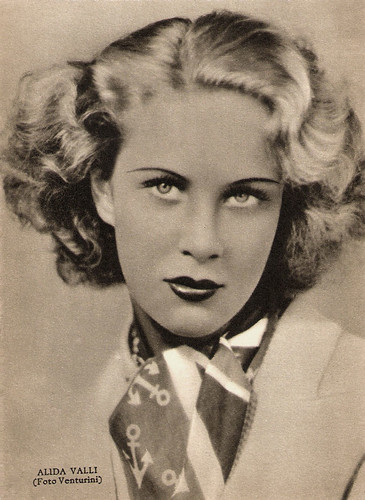
Italian postcard by Rizzoli, Milano, 1941. Photo: Venturini.

Italian postcard by Zincografica, Firenze. Photo: Scalera Film / Era Film, Roma. Publicity still for Noi Vivi/We the Living (Goffredo Alessandrini, 1942).
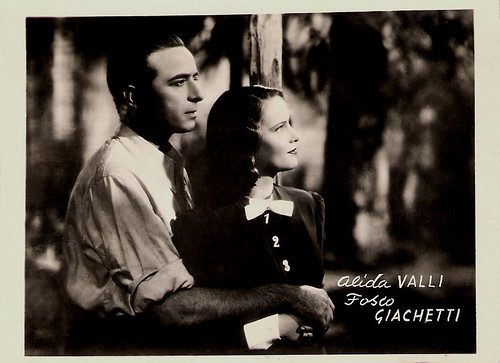
Italian postcard. With Fosco Giachetti.
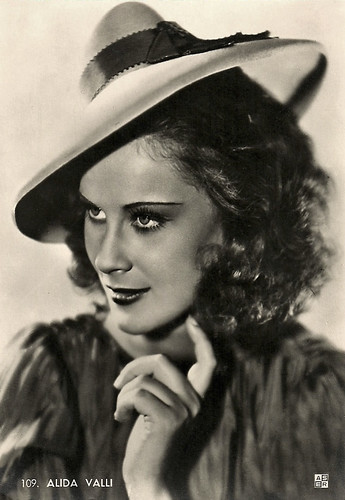
Italian postcard by ASER (A. Scaramaglia Ed. Roma), no. 109.
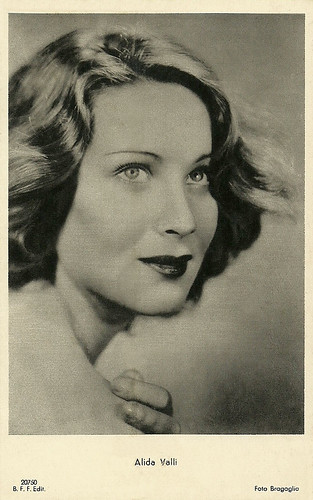
Italian postcard by B.F.F. Edit., no. 20750. Photo: Bragaglia.
By the early 1940s, Alida Valli was top of the bill and became known as ‘Italy’s Sweetheart’. Italcine signed her to a five-year contract. She won an acting award at the Venice Film Festival for Piccolo mondo antico/Old-Fashioned World (Mario Soldati, 1941) with Massimo Serato, about a woman traumatized by her child's death.
During the Second World War, another major success followed with Stasera niente di nuovo/Nothing New This Evening (Mario Mattoli, 1942), the story of a prostitute who refuses help from the reporter (Carlo Ninchi) who loves her. In the film Valli gets to sing Giovanno D’Anzi’s massive hit Ma l’amore no.
For the 19-year-old star, fame and adulation brought both riches and difficulties. Next she played a counter-revolutionary opposite Fosco Giachetti and Rossano Brazzi in Noi Vivi - Addio Kira/We the Living (Goffredo Alessandrini, 1942), based on Ayn Rand's anti-Communist novel. The films were successful, and the public easily realized that they were as much against Fascism as Communism. After several weeks, however, the films were pulled from theatres as the German and Italian governments, which abhorred communism, found out the story also carried an anti-fascist message.
With the Nazi push into Italy, she briefly left film making and hid in a friend's apartment to avoid recruitment into propaganda efforts. Others who joined her there were the jazz composer and surrealist painter Oscar De Mejo, who became her husband in 1944, and jazz pianist Piero Piccioni, who would much later become her lover.
After the war it was the title role in Eugenia Grandet/Eugenie Grandet (Mario Soldati, 1947), an adaptation of Honoré de Balzac’s novel, that marked her return to form. As the suffering Eugenia, she won a best actress Nastro d’Argento award from the Union of Italian Film Journalists, and caught the eye of independent Hollywood producer David O. Selznick.
Selznick signed her to a contract, and groomed her for a major English-language career. She was given a screen billing with just her surname - Valli - to recall the European glamour of ‘Garbo’. However, she was plunked in mediocre fare and, with a language barrier, had a catatonic presence that did not showcase the emotion she brought to her earlier Italian period. American audiences yawned at Alfred Hitchcock's The Paradine Case (1947), in which she was murder suspect Maddalena Paradine defended by Gregory Peck, and The Miracle of the Bells (Irving Pichel, 1948) with Frank Sinatra, in which she played a dead actress whose story is told in flashback.
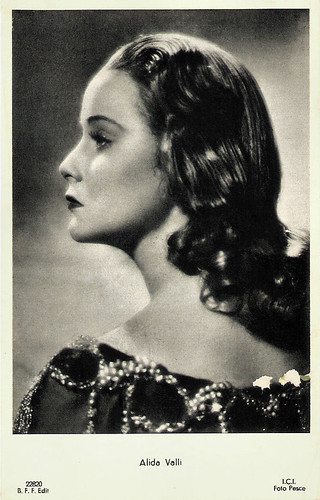
Italian postcard by B.F.F. Edit., no. 22820. Photo: I.C.I. / Pesce.
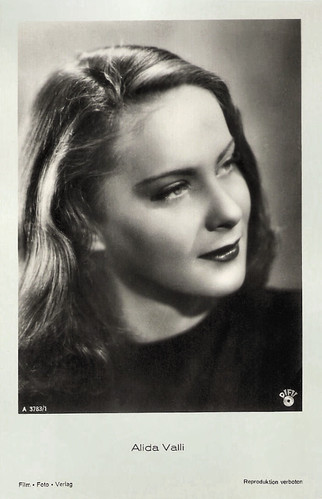
German postcard by Film-Foto-Verlag, no. A 3783/1, 1941-1944. Photo: DIFU.
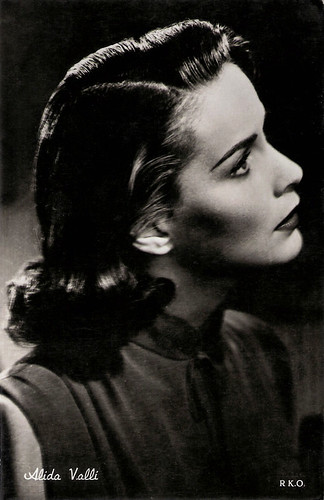
Italian postcard. Photo: RKO.
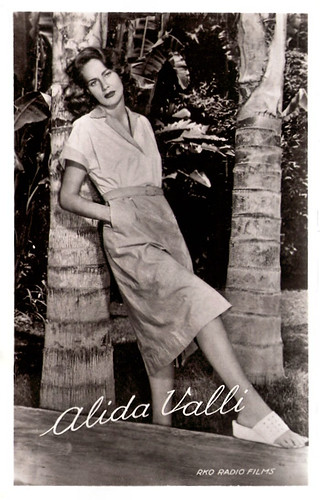
Dutch postcard. Photo: RKO Radio Films.
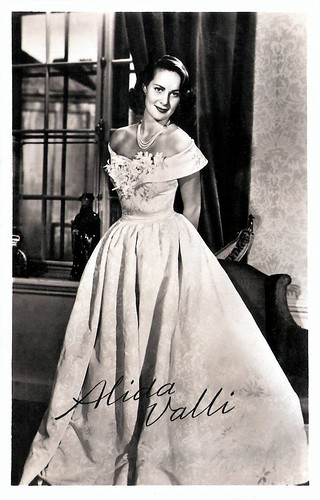
Dutch postcard.

Vintage postcard by IBIS, no. 137.
With Selznick's approval, Alida Valli left for England where she was cast as a mysterious Czech refugee Anna Schmidt wanted by the Russians in post-war Vienna in The Third Man (Carol Reed, 1949). Anna is the devoted lover of Harry Lime (Orson Welles), a racketeer in the black-market world.
The Third Man has since become a classic of unremitting political cynicism, aided by an unexpected zither soundtrack and unforgettable, powerful scenes. One of the best is the final shot in a cemetery, which shows her walking directly past the bumbling American hero (Joseph Cotten), a pulp novelist who, despite all evidence to the contrary, wants to view her character as a damsel in distress.
Valli returned permanently to Europe in 1951 to star opposite Jean Marais in Les Miracles n’ont lieu qu’une fois/Miracles Only Happen Once (Yves Allégret, 1951). It is the story of two enamoured students who, after being separated by the war, are reunited ten years later only to discover that they have changed.
Luchino Visconti offered her the lead role in Senso/Livia (Luchino Visconti, 1954), a beautiful period piece of romance and betrayal based on a novel by Camillo Boito. Set in mid-1800s Venice during the Risorgimento, the film revolves around a Venetian countess torn between nationalistic feelings and an adulterous love for an officer (Farley Granger) of the occupying Austrian forces. Her passionate performance is considered by some the apex of her career, and won her a Best Actress Crystal Star from the French Film Academy. (Senso’s loss at the 1954 Venice Film Festival - the Golden Lion for Best Film went to Renato Castellani’s Romeo and Juliet - caused a furore).
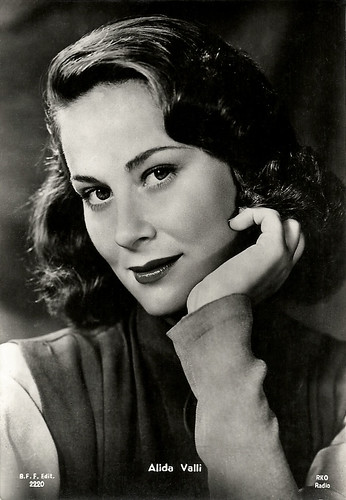
Italian postcard. Ballerini & Fratini, Firenze (B.F.F. Edit.), no 2220. Photo: RKO Radio.

British postcard in the Picturegoer Series, London, no. W 503. Photo: R.K.O. Radio.
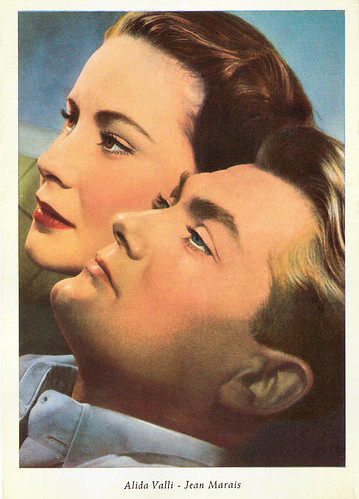
German postcard by Wilhelm Schulze-Witteburg Graphischer Betrieb (WS-Druck), Wanne Eickel. Photo: Deutsche Commerz Film GmbH. Publicity still of Jean Marais and Alida Valli in Les Miracles n'ont lieu qu'une fois/Miracles Only Happen Once (Yves Allégret, 1951).
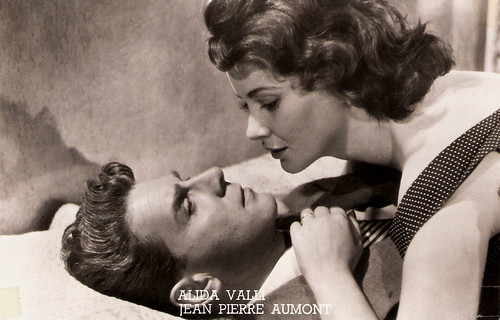
Vintage Postcard, no. 952. Publicity still for Ultimo incontro/Last Meeting (Gianni Franciolini, 1951) with Jean-Pierre Aumont.
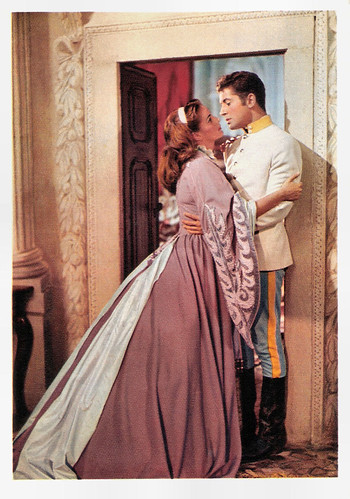
Italian postcard by Rotocalco Dagnino, Torino. Photo: Lux Film. Alida Valli and Farley Granger as countess Livia Serpieri and Lt. Franz Mahler in Luchino Visconti's historical film Senso (1954).
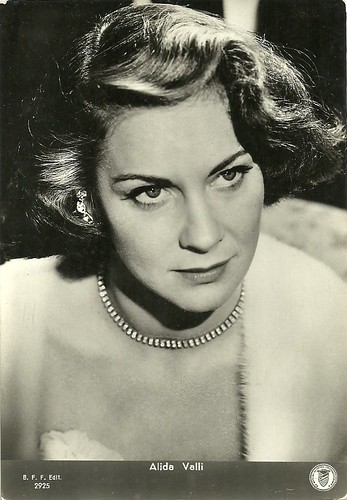
Italian postcard by Ballerini & Fratini, Firenze (B.F.F. Edit.), no. 2925. Photo: Titanus.
As her career was beginning to pick up steam again, Alida Valli became involved in a sex and drugs scandal following the mysterious death of a 20-year-old fashion model named Wilma Montesi, whose body was found on a beach near Rome. Prolonged investigations resulted, involving sensational allegations of drugs and sex orgies in Roman society. Among the accused – all of whom were acquitted, leaving the case unsolved – was Valli's lover, jazz musician Piero Piccioni (son of the Italian Minister of Foreign Affairs). Alida Valli was divorced from Oscar De Mejo in 1952, and she claimed that she and Piccioni were staying at a villa in Capri at the time of the death of Montesi. This was a factor in his acquittal at the trial.
The scandal inspired Federico Fellini's La Dolce Vita/The Sweet Life (1960). In 1957 Valli once again made a glorious come-back with her role in another classic of the European cinema, Michelangelo Antonioni's Il Grido/The Cry (1957) with Steve Cochran. She played a weary and impoverished woman who rejects her working-class lover.
In Italy, she was also well-known for her stage appearances. She had easily moved from ingénue to vivid character roles. In 1956, she made her stage début, starring under the direction of her future husband Giancarlo Zagni at Palermo’s Teatro Biondo in Henrik Ibsen’s Rosmersholm, William Archibald’s The Innocents, and Luigi Pirandello’s L’uomo, la bestia e la virtù/The Man, the Beast and Virtue. She was to appear in more than thirty plays in the next four decades.
Among her later films were La Grande strada azzurra/The Wide Blue Road (Gillo Pontecorvo, 1957) starring Yves Montand, the horror masterpiece Les Yeux sans visage/Eyes Without a Face (Georges Franju, 1960), Une Aussi longue absence/The Long Absence (Henri Colpi, 1962), Ophelia (Claude Chabrol, 1963) with Juliette Mayniel, El hombre de papel/The Paper Man (Ismael Rodriguez, 1963), Edipo re/Oedipus Rex (Pier Paolo Pasolini, 1967) with Silvana Mangano, La prima notte di quiete/The Professor (Valerio Zurlini, 1972), starring Alain Delon, and La Chair de l'orchidée/Flesh of the Orchid (Patrice Chéreau, 1975), starring Charlotte Rampling.
She worked three times with Bernardo Bertolucci, in La strategia del ragno/The Spider's Stratagem (1970), Novecento/1900 (1976), and La Luna/Luna (1979). She also worked with such horror masters as Mario Bava in La Casa dell'esorcismo/The House of Exorcism (1973) and Dario Argento in Suspiria (1977) and Inferno (1980).
More recent were her roles in Il Lungo silenzio/The Long Silence (1993, Margaretha von Trotta) and A Month by the Lake (John Irvin, 1995). Her final film role was in Semana Santa/Angel of Death (Pepe Danquart, 2002), with Mira Sorvino.
In 2006, Alida Valli died in Rome at the age of 84. She had two sons with Oscar De Mejo, Carlo De Mejo and Lorenzo 'Larry' De Mejo. Her grandson Pierpaolo De Mejo is an actor and director, who made the documentary Come diventai Alida Valli/How I Became Alida Valli (2008) about his grandmother.
Trailer for The Third Man (1949). Source: Britmovies (YouTube).
Trailer for Senso (1954). Source: The Criterion Collection (YouTube).
Trailer for Il Grido/The Cry (1957). Source: Danios 12345 (YouTube).
Trailer for Suspiria (1977). Source: Oliver Gašpar (YouTube).
Sources: Michael Plass (Alida Valli Net) (German), Adam Bernstein (Washington Post), Andre Soares (Alternative Film Guide), Gary Brumburgh (IMDb), Wikipedia, Reel Classics, and IMDb.

Italian postcard by Ballerini & Fratini, Firenze (B.F.F. Edit.), no. 4240. Photo: I.C.I. / Vaselli.

German postcard by Film-Foto-Verlag, no. G 210, 1941-1944. Photo: Difu.

Italian postcard by Aser, Roma, no. 250. Photo: Pesce.

Still from The Third Man (1949) with Alida Valli and Joseph Cotten. Source: Dr. Macro's.

Dutch postcard by Takken, Utrecht, no. 1683. Photo: publicity still for Senso (Luchino Visconti, 1954).

Italian postcard by Alterocca, Terni, no. 49474.
Cinécitta
Alida Valli was born as Alida Maria Laura von Altenburger in Pola, a town located in Italy’s Istria region (now Pula, the town currently is part of Croatia) in 1921. Her father, Baron Gino Altenburger, was a philosophy professor and part-time music critic of aristocratic Austrian descent (Alida’s title was Baroness of Marckenstein and Frauenberg) and her mother, Silvia Oberecker della Martina, was a piano teacher of mixed German-Italian parentage (some sources state that she was of Slovenian-Italian descent). Not long after Alida's birth, the family moved to Como, where Alida attended a local school.
Following her father’s death, she and her mother went to Rome where Alida studied acting at the Centro Sperimentale di Cinematografia (CSC), the film academy set up by Benito Mussolini. In 1936, at the age of 15, Alida Altenburger made her first film appearance in the Cinecittà studios with a bit part in I Due sergenti/The Two Sergeants (Enrico Guazzoni, 1936) starring Gino Cervi.
Her surname was changed to the more Italian-sounding Valli (supposedly found by chance in the phone book). In the following years, she often starred in the escapist Telefoni Bianchi productions – the ‘white telephone’ comedies and melodramas always set in very luxurious and wealthy environments.
In 1937, she appeared in the comedy L'amor mio non muore.../A Night in May (Raffaello Matarazzo, 1937), in which she played opposite the Neapolitan acting family Eduardo, Peppino, and Titina DeFilippo.
Her first big success came with the comedies Mille lire al mese/One Thousand Lire per Month (Max Neufeld, 1939) as a beauty with too many worshippers including Osvaldo Valenti, and Assenza ingiustificata/Absence Without Leave (Max Neufeld, 1939), as a young woman who decides to go back to school without the knowledge of her doctor husband (Amedeo Nazzari).
She proved her versatility with the costume drama Manon Lescaut (1940, Carmine Gallone), based on a novel by Abbé Prevost, in which she played the title role opposite matinee idol Vittorio De Sica. Valli’s popularity in the Italian film industry was now near its peak. A poll in the late 1930s had placed her behind only Assia Noris as the most popular female star in the country.

Italian postcard by Rizzoli, Milano, 1939.

Italian postcard by Rizzoli, Milano, 1941. Photo: Venturini.

Italian postcard by Zincografica, Firenze. Photo: Scalera Film / Era Film, Roma. Publicity still for Noi Vivi/We the Living (Goffredo Alessandrini, 1942).

Italian postcard. With Fosco Giachetti.

Italian postcard by ASER (A. Scaramaglia Ed. Roma), no. 109.

Italian postcard by B.F.F. Edit., no. 20750. Photo: Bragaglia.
Italy's Sweetheart
By the early 1940s, Alida Valli was top of the bill and became known as ‘Italy’s Sweetheart’. Italcine signed her to a five-year contract. She won an acting award at the Venice Film Festival for Piccolo mondo antico/Old-Fashioned World (Mario Soldati, 1941) with Massimo Serato, about a woman traumatized by her child's death.
During the Second World War, another major success followed with Stasera niente di nuovo/Nothing New This Evening (Mario Mattoli, 1942), the story of a prostitute who refuses help from the reporter (Carlo Ninchi) who loves her. In the film Valli gets to sing Giovanno D’Anzi’s massive hit Ma l’amore no.
For the 19-year-old star, fame and adulation brought both riches and difficulties. Next she played a counter-revolutionary opposite Fosco Giachetti and Rossano Brazzi in Noi Vivi - Addio Kira/We the Living (Goffredo Alessandrini, 1942), based on Ayn Rand's anti-Communist novel. The films were successful, and the public easily realized that they were as much against Fascism as Communism. After several weeks, however, the films were pulled from theatres as the German and Italian governments, which abhorred communism, found out the story also carried an anti-fascist message.
With the Nazi push into Italy, she briefly left film making and hid in a friend's apartment to avoid recruitment into propaganda efforts. Others who joined her there were the jazz composer and surrealist painter Oscar De Mejo, who became her husband in 1944, and jazz pianist Piero Piccioni, who would much later become her lover.
After the war it was the title role in Eugenia Grandet/Eugenie Grandet (Mario Soldati, 1947), an adaptation of Honoré de Balzac’s novel, that marked her return to form. As the suffering Eugenia, she won a best actress Nastro d’Argento award from the Union of Italian Film Journalists, and caught the eye of independent Hollywood producer David O. Selznick.
Selznick signed her to a contract, and groomed her for a major English-language career. She was given a screen billing with just her surname - Valli - to recall the European glamour of ‘Garbo’. However, she was plunked in mediocre fare and, with a language barrier, had a catatonic presence that did not showcase the emotion she brought to her earlier Italian period. American audiences yawned at Alfred Hitchcock's The Paradine Case (1947), in which she was murder suspect Maddalena Paradine defended by Gregory Peck, and The Miracle of the Bells (Irving Pichel, 1948) with Frank Sinatra, in which she played a dead actress whose story is told in flashback.

Italian postcard by B.F.F. Edit., no. 22820. Photo: I.C.I. / Pesce.

German postcard by Film-Foto-Verlag, no. A 3783/1, 1941-1944. Photo: DIFU.

Italian postcard. Photo: RKO.

Dutch postcard. Photo: RKO Radio Films.

Dutch postcard.

Vintage postcard by IBIS, no. 137.
A Classic Of Unremitting Political Cynicism
With Selznick's approval, Alida Valli left for England where she was cast as a mysterious Czech refugee Anna Schmidt wanted by the Russians in post-war Vienna in The Third Man (Carol Reed, 1949). Anna is the devoted lover of Harry Lime (Orson Welles), a racketeer in the black-market world.
The Third Man has since become a classic of unremitting political cynicism, aided by an unexpected zither soundtrack and unforgettable, powerful scenes. One of the best is the final shot in a cemetery, which shows her walking directly past the bumbling American hero (Joseph Cotten), a pulp novelist who, despite all evidence to the contrary, wants to view her character as a damsel in distress.
Valli returned permanently to Europe in 1951 to star opposite Jean Marais in Les Miracles n’ont lieu qu’une fois/Miracles Only Happen Once (Yves Allégret, 1951). It is the story of two enamoured students who, after being separated by the war, are reunited ten years later only to discover that they have changed.
Luchino Visconti offered her the lead role in Senso/Livia (Luchino Visconti, 1954), a beautiful period piece of romance and betrayal based on a novel by Camillo Boito. Set in mid-1800s Venice during the Risorgimento, the film revolves around a Venetian countess torn between nationalistic feelings and an adulterous love for an officer (Farley Granger) of the occupying Austrian forces. Her passionate performance is considered by some the apex of her career, and won her a Best Actress Crystal Star from the French Film Academy. (Senso’s loss at the 1954 Venice Film Festival - the Golden Lion for Best Film went to Renato Castellani’s Romeo and Juliet - caused a furore).

Italian postcard. Ballerini & Fratini, Firenze (B.F.F. Edit.), no 2220. Photo: RKO Radio.

British postcard in the Picturegoer Series, London, no. W 503. Photo: R.K.O. Radio.

German postcard by Wilhelm Schulze-Witteburg Graphischer Betrieb (WS-Druck), Wanne Eickel. Photo: Deutsche Commerz Film GmbH. Publicity still of Jean Marais and Alida Valli in Les Miracles n'ont lieu qu'une fois/Miracles Only Happen Once (Yves Allégret, 1951).

Vintage Postcard, no. 952. Publicity still for Ultimo incontro/Last Meeting (Gianni Franciolini, 1951) with Jean-Pierre Aumont.

Italian postcard by Rotocalco Dagnino, Torino. Photo: Lux Film. Alida Valli and Farley Granger as countess Livia Serpieri and Lt. Franz Mahler in Luchino Visconti's historical film Senso (1954).

Italian postcard by Ballerini & Fratini, Firenze (B.F.F. Edit.), no. 2925. Photo: Titanus.
Sex and Drugs Scandal
As her career was beginning to pick up steam again, Alida Valli became involved in a sex and drugs scandal following the mysterious death of a 20-year-old fashion model named Wilma Montesi, whose body was found on a beach near Rome. Prolonged investigations resulted, involving sensational allegations of drugs and sex orgies in Roman society. Among the accused – all of whom were acquitted, leaving the case unsolved – was Valli's lover, jazz musician Piero Piccioni (son of the Italian Minister of Foreign Affairs). Alida Valli was divorced from Oscar De Mejo in 1952, and she claimed that she and Piccioni were staying at a villa in Capri at the time of the death of Montesi. This was a factor in his acquittal at the trial.
The scandal inspired Federico Fellini's La Dolce Vita/The Sweet Life (1960). In 1957 Valli once again made a glorious come-back with her role in another classic of the European cinema, Michelangelo Antonioni's Il Grido/The Cry (1957) with Steve Cochran. She played a weary and impoverished woman who rejects her working-class lover.
In Italy, she was also well-known for her stage appearances. She had easily moved from ingénue to vivid character roles. In 1956, she made her stage début, starring under the direction of her future husband Giancarlo Zagni at Palermo’s Teatro Biondo in Henrik Ibsen’s Rosmersholm, William Archibald’s The Innocents, and Luigi Pirandello’s L’uomo, la bestia e la virtù/The Man, the Beast and Virtue. She was to appear in more than thirty plays in the next four decades.
Among her later films were La Grande strada azzurra/The Wide Blue Road (Gillo Pontecorvo, 1957) starring Yves Montand, the horror masterpiece Les Yeux sans visage/Eyes Without a Face (Georges Franju, 1960), Une Aussi longue absence/The Long Absence (Henri Colpi, 1962), Ophelia (Claude Chabrol, 1963) with Juliette Mayniel, El hombre de papel/The Paper Man (Ismael Rodriguez, 1963), Edipo re/Oedipus Rex (Pier Paolo Pasolini, 1967) with Silvana Mangano, La prima notte di quiete/The Professor (Valerio Zurlini, 1972), starring Alain Delon, and La Chair de l'orchidée/Flesh of the Orchid (Patrice Chéreau, 1975), starring Charlotte Rampling.
She worked three times with Bernardo Bertolucci, in La strategia del ragno/The Spider's Stratagem (1970), Novecento/1900 (1976), and La Luna/Luna (1979). She also worked with such horror masters as Mario Bava in La Casa dell'esorcismo/The House of Exorcism (1973) and Dario Argento in Suspiria (1977) and Inferno (1980).
More recent were her roles in Il Lungo silenzio/The Long Silence (1993, Margaretha von Trotta) and A Month by the Lake (John Irvin, 1995). Her final film role was in Semana Santa/Angel of Death (Pepe Danquart, 2002), with Mira Sorvino.
In 2006, Alida Valli died in Rome at the age of 84. She had two sons with Oscar De Mejo, Carlo De Mejo and Lorenzo 'Larry' De Mejo. Her grandson Pierpaolo De Mejo is an actor and director, who made the documentary Come diventai Alida Valli/How I Became Alida Valli (2008) about his grandmother.
Trailer for The Third Man (1949). Source: Britmovies (YouTube).
Trailer for Senso (1954). Source: The Criterion Collection (YouTube).
Trailer for Il Grido/The Cry (1957). Source: Danios 12345 (YouTube).
Trailer for Suspiria (1977). Source: Oliver Gašpar (YouTube).
Sources: Michael Plass (Alida Valli Net) (German), Adam Bernstein (Washington Post), Andre Soares (Alternative Film Guide), Gary Brumburgh (IMDb), Wikipedia, Reel Classics, and IMDb.
1 comment:
Third Man is one of my favorites. I never tire of her performance, so many shades of emotion. This is so informative. Look forward to checking out other posts.
Post a Comment